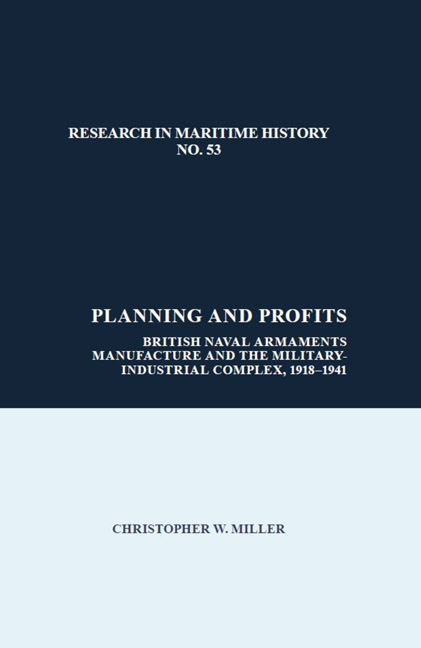 Planning and Profits
Planning and Profits Book contents
- Frontmatter
- Contents
- Acknowledgements
- About the Author
- List of Tables and Figures
- List of Illustrations
- List of Abbreviations
- A Note on Definitions
- Part One Introduction
- Part Two Industry and the Navy before Manchuria, and the Establishment of the Warshipbuilders’ Committee, 1919–1931
- Part Three The Formation of a National Government, the Far East, and the PSOC Approach to Industry, 1931–1934
- Part Four The Ultimate Potential Enemy and Rearmament Planning, 1934–1936
- 7 Towards Rearmament, 1934–1935
- 8 The White Papers, 1935–1936
- Part Five The Inskip Era and War, 1936–1941
- Conclusion and Retrospective
- Appendices
- Bibliography
- Index
8 - The White Papers, 1935–1936
from Part Four - The Ultimate Potential Enemy and Rearmament Planning, 1934–1936
- Frontmatter
- Contents
- Acknowledgements
- About the Author
- List of Tables and Figures
- List of Illustrations
- List of Abbreviations
- A Note on Definitions
- Part One Introduction
- Part Two Industry and the Navy before Manchuria, and the Establishment of the Warshipbuilders’ Committee, 1919–1931
- Part Three The Formation of a National Government, the Far East, and the PSOC Approach to Industry, 1931–1934
- Part Four The Ultimate Potential Enemy and Rearmament Planning, 1934–1936
- 7 Towards Rearmament, 1934–1935
- 8 The White Papers, 1935–1936
- Part Five The Inskip Era and War, 1936–1941
- Conclusion and Retrospective
- Appendices
- Bibliography
- Index
Summary
The Statement Relating to Defence (more commonly known as the White Paper) of March 1935 was a watershed in the history of defence between the wars, at least insofar as it finally put rearmament and deficiencies into the public domain. In terms of the background to its publication, there had been little movement from the National Government since Manchuria towards publicly announcing an intention to rearm. Although the Admiralty had constantly warned of the Japanese threat from the second half of the 1920s, the CID had harboured deep concerns about the Far East and Germany as far back as 1930, and the PSOC had highlighted the supply and labour bottlenecks connected with future defence schemes from 1933, the National Government had remained outwardly reluctant to support rearmament or industrial mobilisation. This position did not change in 1934. The reason for this is not hard to locate: public support for any form of defence spending had been extremely low since the end of the Great War, and any hint of armed conflict thereafter usually resulted in some sort of outcry against British involvement. Although there was a growing feeling of insecurity about developments in Germany, this had not managed to overcome the strong pacifist sentiments that still existed. At best, the German situation had reaffirmed public support for the concept of “collective security,” primarily through the League of Nations, but until that point events such as Manchuria and the talks in Geneva had only served to highlight to the British government just how strong was the distaste for war. Thus, this was a period where deficiencies were not hard to spot, but nevertheless they were not remedied.
Politics, Pacifism and “Going Public,” November 1934–March 1935
The pacifist sentiment is borne out by almost all polling between Manchuria and the first White Paper. “Peace candidates” had performed particularly strongly in by-elections between October 1933 and December 1934 – in Fulham the National Government majority of more than 14,500 was replaced by a Labour majority of nearly 5000, while in Lambeth and Putney the swing away from the National Government was even higher. A straw-poll in a London newspaper had more than seventy-five percent of respondents desiring Britain to stay out of any Franco-German conflict, regardless of the circumstances.
- Type
- Chapter
- Information
- Planning and ProfitsBritish Naval Armaments Manufacture and the Military-Industrial Complex, 1918–1941, pp. 143 - 172Publisher: Liverpool University PressPrint publication year: 2018
